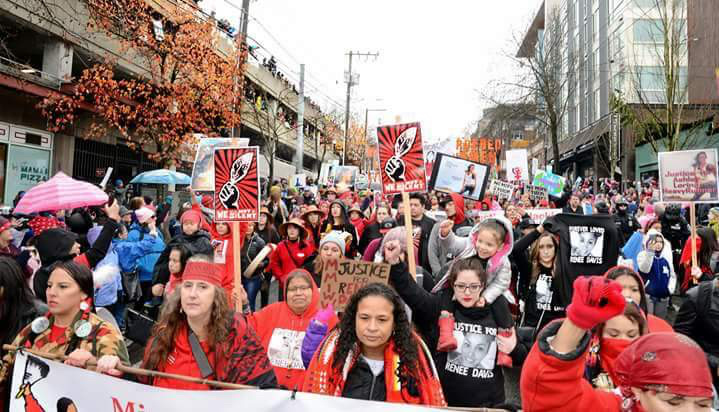Bree Black Horse pictured, wearing black, at right.
By Elisabeth Guard
On January 20, 2018, in Seattle, Washington, Native women led the Women’s March to call attention to the epidemic of missing and murdered Native women in the United States and Canada.
Native women in the United States experience some of the highest rates of sexual assault in the Nation: more than half of Native women will be the victim of domestic violence or sexual assault; four out of five are expected to encounter violence in their lifetimes; one in three will be raped in their lifetime; and the murder rates of Native women exceed ten times the national average in some tribal and urban communities. The most alarming data comes from the Center for Disease Control and Prevention, which reported that in 2016 the third-leading cause of death for Native women between the ages of ten and twenty-four was murder.
On January 29, 2018, Representatives Gina McCabe, Mia Gregerson, Melanie Stambaugh, Derek Stanford, Kristine Reeves, Mary Dye, Andrew Barkis, and Senator Maureen Walsh introduced HB-2951, to do something about it.
The bill seeks to “[o]rder[] a study to determine how to increase reporting and investigation of missing Native American women.” HB-2951 requires that “[t]he Washington state patrol must conduct a study to determine how to increase state criminal justice protective and investigative resources for reporting and identifying missing Native American women in the state.”
Washington state patrol must work in collaboration with tribal law enforcement officers and the federal department of justice to increase reporting, information sharing, and coordination of resources. “By December 1, 2018, the state patrol must report to the legislature on the results of the study, including data and analysis of the number of missing Native American women in the state, identification of barriers in providing state resources to address the issue, and recommendations, including any proposed legislation that may be needed to address the problem.”
The Canadian government has taken a similar approach to investigating the epidemic of missing Native American women in Canada. In December of 2016, Canadian Prime Minister Justin Trudeau announced a long-awaited national inquiry into the disappearances and murders of indigenous women. Although the Royal Canadian Mounted Police have officially counted about 1,200 cases of missing or murdered Indigenous women over the past three decades, the research actually suggests that the total number could be as high as 4,000. This inquiry has been heavily criticized for failing to include the families of the missing or murdered women and many question whether the inquiry will be able to uncover the root causes of why indigenous women are murdered or go missing at such high rates.
Although in the U.S. the Violence Against Women Act and the Tribal Law and Order Act have helped bring attention to the high rate of violence against Native women, there is no system to collect comprehensive data regarding the number of missing and murdered Native women.
The introduction of HB-2951 is a first step for Washington State in addressing the missing Native women within the state. While there is not a clear-cut path forward to ending the epidemic of missing and murdered Native women, gathering data that provides correct figures of the gravity of this crisis is vital. I remain hopeful that HB-2951 is only the beginning and that Washington will avoid the pitfalls that has plagued Canada’s inquiry; however, it is still vital for Native activist to continue to speak about this issue and keep pressure on Washington’s legislatures.
You can provide comments on HB-2951 here.
Elisabeth is an associate in the Seattle office of Galanda Broadman. Elisabeth’s practice focuses on complex federal court litigation. She can be reached at (206) 557-7509 or elisabeth@galandabroadman.com.





